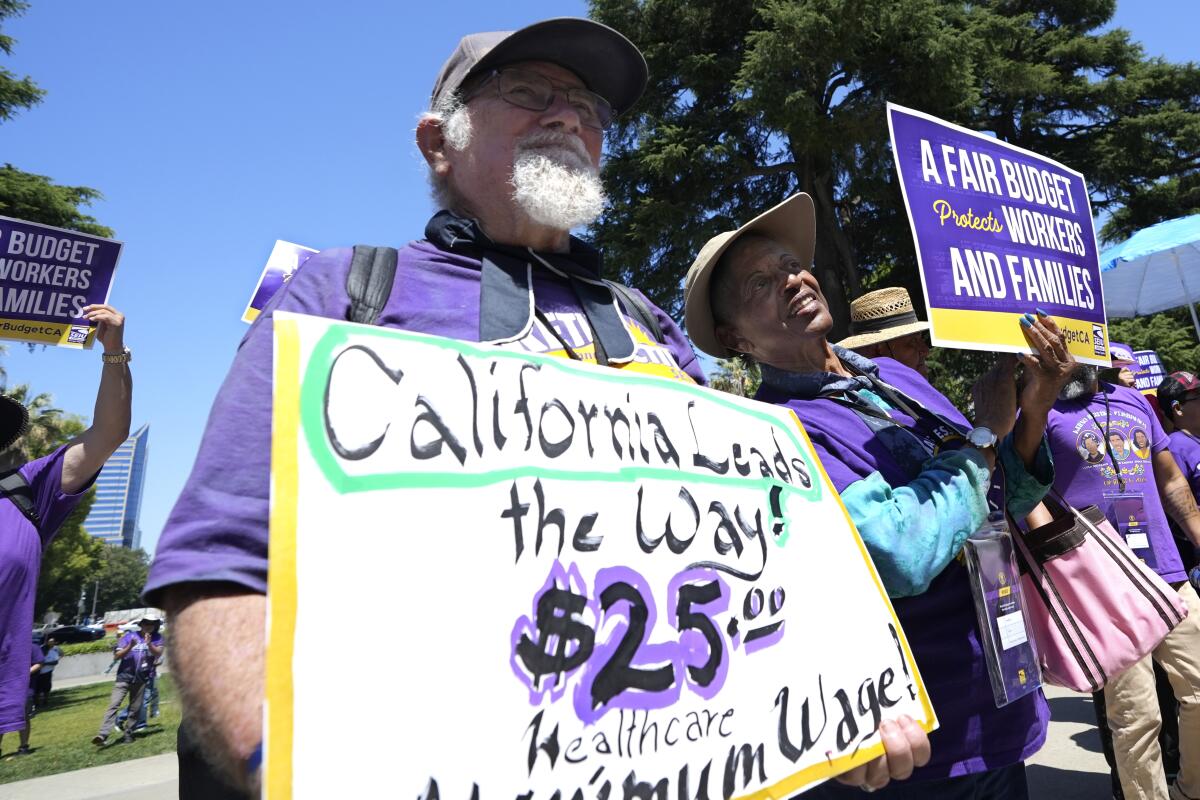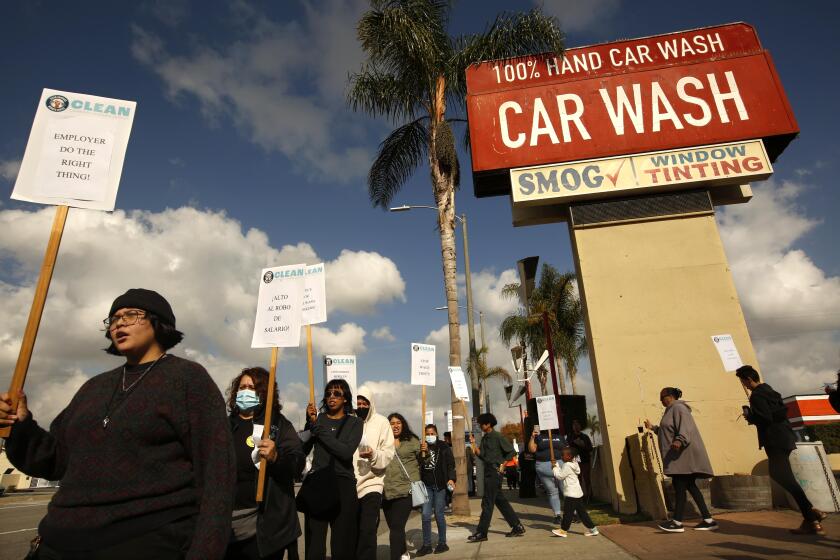Secret negotiations heat up in Sacramento as budget, ballot deadlines loom

- Share via
SACRAMENTO — With hundreds of thousands of Californians losing homeowners insurance as companies pull out of an increasingly tinder-dry state, political leaders in Sacramento have spent the last two years trying to figure out how to solve the crisis.
Yet even though they’ve held a raft of public hearings and workshops on potential new laws and regulations, another plan is germinating behind closed doors. A select group of Democratic senators recently began discussing insurance issues privately on Zoom — with no public notice of their meetings, no public agenda and no opportunities for anyone other than invited guests and lobbyists to participate.
The arrangement is legal because the California Legislature exempted itself from the state’s open meetings law that other government agencies must obey. And it’s not uncommon at the Capitol for politically sensitive disagreements to get resolved behind closed doors.
But the amount of backroom negotiations underway this month is especially intense due to two upcoming deadlines. The governor must sign a balanced state budget by June 30, and the deadline to put measures on the November ballot is June 27. This year‘s secret budget conversations are intertwined with dealmaking around the 2024 ballot.
Gov. Gavin Newsom and Democratic lawmakers work to settle their differences over a few key budget cuts to reduce California’s massive deficit.
“Every year there are pieces of legislation that ignite a firestorm among the public and result in huge amounts of activism in and around the Capitol,” said Jonathan Mehta Stein, executive director of California Common Cause.
“Equally important, or more important, decisions are being made through the budget process, and billions of dollars are being distributed with a comparatively much, much smaller amount of public involvement, public oversight and public activism.”
The Legislature passed a temporary budget Thursday that reflects agreements between the Senate and the Assembly. As they cast their votes, Democrats repeatedly emphasized how open they’ve been in crafting their budget.
“We’ve had 72 public hearings,” Assembly Budget Chair Jesse Gabriel (D-Encino) said after the vote. “I have sat through hours of public comment, as have all of the sub chairs.”
“I think Californians have a good understanding of what the major issues are that are at stake in this process.”
But the Legislature’s budget is not a done deal. Closed-door meetings continue with the governor as they work to close a $45-billion deficit and land a final funding plan for the fiscal year that begins July 1. Beyond the budget, elected officials are also negotiating with interest groups over proposed statewide ballot measures that include billions of dollars in bonds to build schools, housing and environmental projects.
Sacramento lawmakers have been bombarded with ads and pitches in support of a ballot proposal that would have the state borrow as much as $10 billion.
Though California is famous for its citizen-led initiatives that allow anyone with enough money or political support to gather signatures to place a proposal before voters, a relatively new law gives politicians more say in what reaches the ballot. Changes enacted a decade ago give initiative proponents a window of time to pull their measures off the ballot. That’s created a rush of negotiations as Gov. Gavin Newsom and lawmakers try to persuade some interest groups to drop their initiatives in exchange for policy changes from Sacramento.
These are some key issues being deliberated in secret:
How to get tough on crime:
Lawmakers have spent months crafting a package of bills to address retail theft and fentanyl addiction. The legislation has gone through multiple public hearings and debate at the Capitol. Meanwhile, district attorneys have been collecting signatures for a ballot measure to roll back parts of Proposition 47, the decade-old law that changed some felony drug and property theft offenses into misdemeanors. Their initiative, which is backed by law enforcement groups and major retailers, just qualified for the ballot last week.
But Newsom and legislative leaders have so far said they don’t want to bring Proposition 47 back to voters. That’s where the backroom dealmaking comes in.
In a closed-door meeting two weeks ago, representatives for Assembly Speaker Robert Rivas (D-Hollister) made a strong-arm move to try to persuade the proponents of the ballot measure to rescind their proposal, telling them lawmakers are adding a provision to the anti-theft bills that will revoke the legislation if the ballot measure passes.
Legislative leaders said the move is necessary to avoid technical conflicts between the ballot measure and the bills. But it had the effect of jump-starting negotiations over what it could take for proponents to pull their measure off the ballot, or to agree to reforms both sides can live with.
California Democrats plan to pass a package of needed legislation to stem the splurge of retail thefts, from petty shoplifting to professional smash-and-grab robberies. But some in the party cynically intend to insert a “poison pill.”
When to give healthcare workers a raise:
Last year the governor signed a law to raise the minimum wage for healthcare workers to $25 an hour — a plan lawmakers changed so significantly at the last minute that no cost estimate was available when they passed the bill. It turned out to be one of the most expensive new state laws in years, with Newsom’s Department of Finance projecting a price tag of $4 billion.
After signing the bill, Newsom told The Times he privately reached an “understanding” with lawmakers that the state would have the power to tweak the plan in times of financial distress. But when and how to delay the raises? Those details are the subject of secret negotiations that have been going on for months among Newsom’s administration, labor union representatives and other healthcare interests.
The governor said in May that he won’t sign a budget until the issue is resolved. But he wouldn’t say much more than that about how he wants to change the policy that could affect about 400,000 Californians. Democrats who supported the legislation have been just as tight-lipped.
“One of the things I’ve learned the hard way is talking too publicly about a process that’s unfolding in real time,” Newsom said at his budget presentation in May.
Weeks later, he shot down transparency concerns, saying California law requires that bills be made public for 72 hours before lawmakers can vote on them.
“There’s a lot of public review, a lot of transparency. It’s just a lot of work when you’re governing one of the largest economies in the world, there are a lot of moving parts,” he said. “We actually have some of the most transparent public processes in the country. In many ways, we’re a model.”

How much to bend to big business:
Some of the largest companies in the state have banded together to place two measures on the November ballot that unions and Democrats oppose. One would make it harder for the state to increase taxes, the other would curtail a unique California law that allows workers to sue employers on behalf of other workers.
Rob Lapsley, president of the California Business Roundtable, participated in private meetings last week with Rivas and Senate leader Mike McGuire (D-Healdsburg) to discuss elements of the Taxpayer Protection and Government Accountability Act. The business group is a proponent of the measure, which Lapsley describes as a necessary check and balance on a supermajority of Democrats running California government. Removing the initiative from the ballot is a top priority for labor unions, Newsom and Democratic lawmakers.
Lapsley has said he’s been “crystal clear” that he would meet with anyone who wants to discuss the measure. So far, it’s unclear whether the opponents can offer strong enough incentives for him to end his campaign, which Democrats have challenged in the California Supreme Court.
A business-backed ballot initiative would hurt workers, labor researchers say. But proponents say lawsuits don’t help workers and hurt small businesses and nonprofits.
How to pay for expanding Medi-Cal:
A fight playing out in the dark over funding for California’s healthcare system for the poor is pitting Newsom against some of his top allies.
Anticipating the state budget crisis to continue in the years ahead, the governor proposed using revenue from a tax on managed care organizations, called the MCO tax, to avoid cuts to Medi-Cal.
A coalition led by the California Medical Assn. and Planned Parenthood called for the governor to stick to an agreement he made in 2023 — and reneged on this year — to use some of the funding to increase payments to providers who accept Medi-Cal patients.
The group is leading a charge to pass a measure on the 2024 ballot that would permanently establish an MCO tax to fund higher reimbursement rates. The coalition argues that increasing rates is critical to improving access to care as the state expands enrollment to immigrants who are in the country illegally.
The governor wants the coalition to delay the measure from taking effect, or take it off the ballot. But the coalition, which has struggled to secure an ongoing funding source for rate increases for over a decade, is afraid Democrats will divert the money again if it stands down.
Gabriel, the Assembly member who leads the budget committee, said Thursday that it’s “been a complicated conversation.”
How much money to ask voters to borrow:
Last year lawmakers introduced roughly a dozen bond proposals totaling $100 billion in borrowing. Many of them were debated publicly early in the year, but then shelved.
Now, as lawmakers face the June 27 deadline to place bonds on the November ballot, negotiations have heated up behind closed doors. The debate has centered on how much money to ask voters to borrow and which of three possible bonds to put on the ballot: school construction, affordable housing and infrastructure to help manage extreme weather exacerbated by climate change.
Democrats in the Senate and Assembly have been deliberating during private caucus meetings, which are attended only by lawmakers of the same party. Those conversations resulted in Democrats choosing to place bonds on the ballot to fund climate change programs and school facilities instead of housing, sources say. But nothing has been announced publicly.
California Gov. Gavin Newsom has proposed urgency legislation to expedite the hiking of homeowner insurance rates. It’s about time. Because the alternative for many is no insurance at all.
What to do about the homeowners insurance crisis:
There’s been no shortage of public attention to the problem of insurance companies declining coverage for homes they deem too risky due to wildfires. California lawmakers have held hearings on legislation to stem the problem. The state insurance commissioner has crafted new regulations to stabilize the market. Newsom is backing a bill to speed up the process for reviewing requests by insurers to raise rates.
But McGuire, the state Senate leader who comes from a wine country region where many constituents have had their insurance dropped after a wave of devastating blazes, said the changes proposed so far are not enough. That’s why he brought together several Democratic colleagues to form a working group on insurance.
He said he’s hoping to build consensus on how the state can give homeowners assurance they will be covered if they take steps to make their property fire-resistant.
“I have been kicked in the teeth over and over by industry on this issue,” McGuire said in an interview.
“Shame on me if I don’t use this opportunity to be able to advance legislation that we should have implemented years ago that would help stabilize the market and give homeowners the tools they need to make their neighborhood more fire safe.”
He said he’s trying to develop legislation that could pass by the end of August but realizes it may take until next year. He said any bills that emerge from the private working group will go through the Legislature’s public vetting process.
More to Read
Sign up for Essential California
The most important California stories and recommendations in your inbox every morning.
You may occasionally receive promotional content from the Los Angeles Times.



















